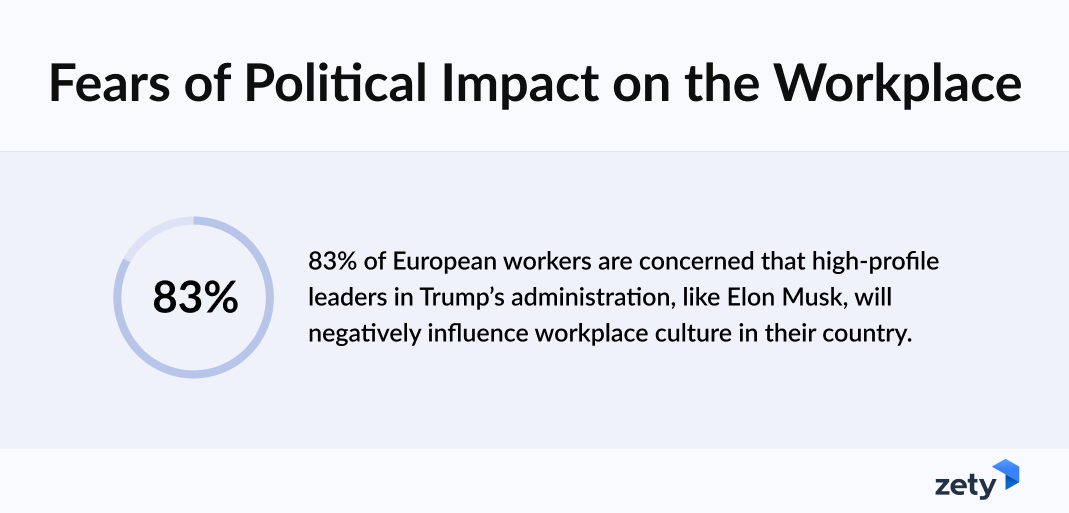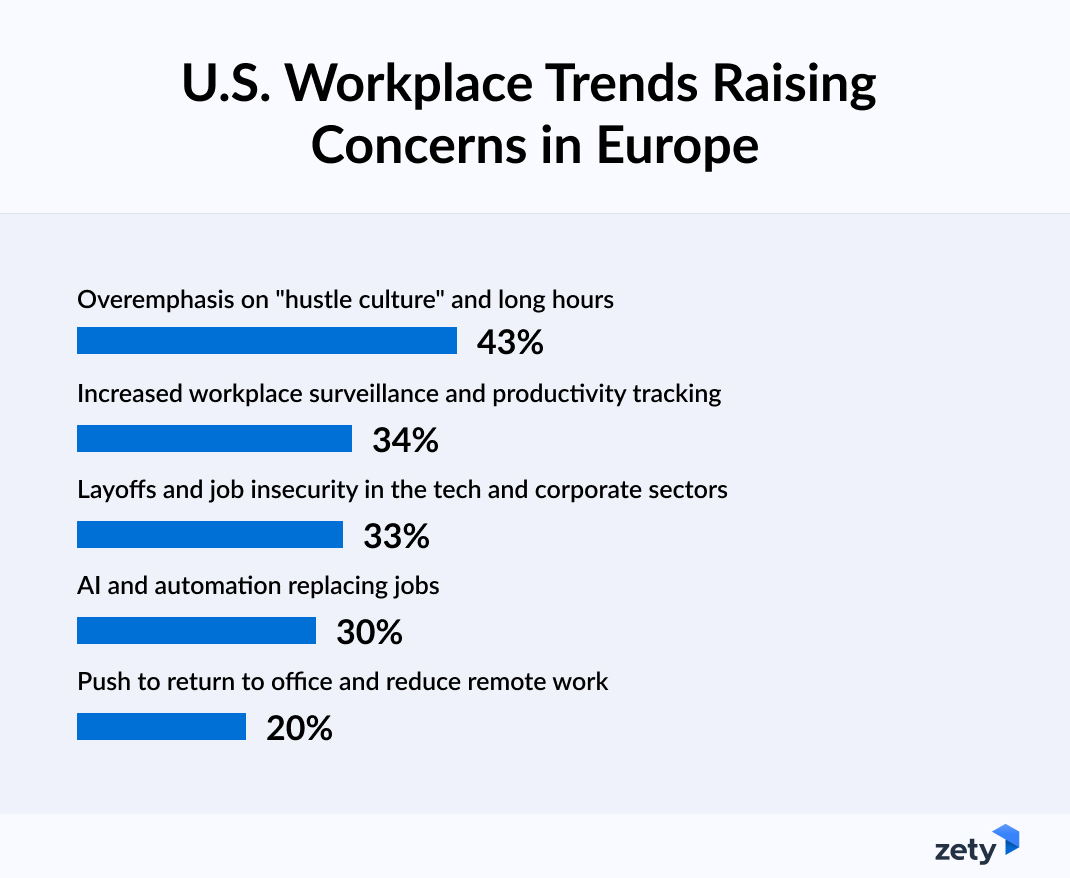Is the American Dream Turning into a Nightmare? Exploring Workplace Trends in 2025
Create your CV nowEuropeans have long enjoyed employment benefits: weeks of paid holiday, health insurance, and flexible arrangements. But recent changes in the American workplace culture haven’t gone unnoticed. Zety surveyed 1,000 labour force participants from the UK, France, Germany, Italy, and Spain to learn how they view these new corporate trends.
Key findings:
- Growing U.S. influence: 86% of respondents claim that the U.S. corporate culture increasingly influences European companies.
- Work-life balance is under attack: 78% of employees worry that U.S. corporate practices threaten European labour laws.
- Fearing American trends: 76% worry that adopting the U.S. “always-on” work culture could diminish their mental wellbeing.
- Recession on the horizon: 71% are concerned that their workplaces could be affected by a possible U.S. recession.
- Yes to strong labour laws: 68% believe that labour protections need strengthening against U.S. workplace regulations.
Growing concerns regarding the U.S. corporate influence
When U.S.-owned businesses create nearly 1.5 million jobs in the U.K., it’s no wonder that many employees fear the recent workplace changes introduced by American corporations.
Zety’s survey results show that the vast majority of European workers worry that their work environments could be affected negatively:
- 86% of respondents claim that European companies are increasingly influenced by U.S. workplace culture, and 37% say that this influence has grown significantly.
- 83% worry that high-profile leaders in President Trump’s administration, such as Elon Musk, can pose a negative influence on the workplace culture in their country.
- 78% think that European workplace perks, such as strong labour laws, paid holidays, and work-life balance, could be threatened by U.S. corporate practices.
- 71% are concerned that their workplaces could be impacted by a possible recession in the U.S.

No support for American workplace regulations
The average labour force participant in the U.K. has enough reasons to worry: one in four employers plans redundancies in 2025. The negative workplace trends in the U.S. are an additional concerning factor.
The cultural divide between European and American work norms is easy to spot:
- 95% of European employees believe that European labour laws must be independent of U.S. corporate influence.
- 68% of respondents support stronger labour laws as a response to the introduction of the U.S. workplace regulations.
- 59% think that protecting European labour laws from American influence is a key priority.
- 34% say they would look for a new job if their employer implemented U.S. corporate norms such as longer working hours, return-to-office policies, weekly accountability reports, or fewer holidays.
Major red flags within the U.S. corporate norms
Employees within the U.K. and other European countries aren’t impressed by American corporate habits. It’s the opposite: many workers perceive U.S. workplace rules as invasive.
According to Zety’s survey, here are the key red flags they notice:
- 43% of surveyed employees worry that there’s too much emphasis on “hustle culture” and long working hours.
- 34% are concerned about growing workplace surveillance and productivity tracking.
- 33% worry about possible layoffs and job insecurity in tech and corporate sectors.
- 30% fear that AI and automation will replace their jobs.
- 20% are concerned about mandatory return to the office and reduced remote work.

Threats to work-life balance
It seemed that policies leading to an improved work-life balance were here to stay, as they offered mutual benefits for employees and employers. However, the recent adoption of American-style corporate policies shows that the status quo may not be permanent.
Concerns about personal well-being are reflected in the results of Zety’s survey:
- 76% of respondents say that following the U.S. “always-on” corporate norms would diminish their mental health.
- 48% would consider quitting if their work-life balance were significantly affected by American-style workplace policies.
This should serve as a warning call to companies considering adopting U.S. corporate culture, as it’s unlikely that employees would peacefully accept changes affecting their personal lives.
No allure in the American dream
America was once a mythical land of prosperity and career opportunities, but not anymore. Nowadays, it’s hard to find any qualities of the U.S.-style work approach that European citizens could admire.
Here’s what some respondents found appealing about U.S. work norms:
- 42% of surveyed workers named higher salaries and performance-based pay as the most significant draw.
- 27% of respondents pointed out job opportunities in innovative industries.
- 24% appreciated the American entrepreneurial mindset and career mobility.
- 22% considered the U.S. focus on individual achievement appealing.
It appears that the divide between European and American workplace attitudes can be difficult to bridge at this very moment, which is something that corporate decision-makers should take into account when outlining upcoming workplace policies.
Methodology
The presented results were collected by Zety through a survey of 1,000 workers from the U.K., Italy, France, Spain, and Germany, with 200 respondents from each country. The survey was conducted on March 21, 2025, using Pollfish. Each participant was questioned regarding the influence of the U.S. workplace trends in Europe using multiple question types, including yes/no questions, scale-based questions, estimating agreement levels, and selecting multiple options from a list of pre-defined answers.
About Zety’s Editorial Process
Our editorial team has thoroughly reviewed this article to ensure it follows Zety’s editorial guidelines. Our dedication lies in sharing our expertise and providing you with actionable career advice that offers you real value. Every year, the quality of our content attracts 40 million readers to our site. But that’s not all – we conduct original research to gain a detailed understanding of the labour market. We take pride in being cited by top universities and leading media outlets in the UK and worldwide.



